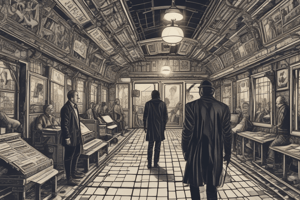Podcast
Questions and Answers
What is the primary distinction between qualitative and quantitative research methods in social science?
What is the primary distinction between qualitative and quantitative research methods in social science?
- Quantitative methods are purely observational, whereas qualitative methods incorporate experimental designs.
- Quantitative methods involve subjective interpretation, whereas qualitative methods rely on objective analysis.
- Qualitative methods focus on numerical data, while quantitative methods analyze non-numerical data.
- Qualitative methods emphasize personal perspectives, while quantitative methods prioritize statistical analysis. (correct)
Which of the following best defines the concept of sociological imagination?
Which of the following best defines the concept of sociological imagination?
- The ability to see personal experiences within a broader social context. (correct)
- The capacity to analyze society through statistical methods.
- The tendency to focus solely on individual behavior without considering societal influences.
- The understanding of one's personal beliefs and values.
How do working-class parents typically differ from middle-class parents in their approach to socialization?
How do working-class parents typically differ from middle-class parents in their approach to socialization?
- Middle-class parents tend to use more resources for organized activities compared to working-class parents. (correct)
- Working-class parents encourage independence more than middle-class parents do.
- Working-class parents emphasize cognitive development, while middle-class parents focus on character building.
- Middle-class parents are usually more authoritarian than working-class parents.
In sociology, what does the term 'social construction' imply about reality?
In sociology, what does the term 'social construction' imply about reality?
Which of the following is a main component of culture?
Which of the following is a main component of culture?
What is the primary purpose of sanctions within a social context?
What is the primary purpose of sanctions within a social context?
What role does culture play in shaping human behavior according to sociologists?
What role does culture play in shaping human behavior according to sociologists?
Which concept is indicated by the term 'social control'?
Which concept is indicated by the term 'social control'?
What distinguishes formal deviance from informal deviance?
What distinguishes formal deviance from informal deviance?
What best describes the concept of agency in sociology?
What best describes the concept of agency in sociology?
Flashcards are hidden until you start studying
Study Notes
Modern Society Characteristics
- Complex social structures, with specialized roles and institutions.
- Large-scale, urbanized populations with diverse cultural backgrounds.
- Technological advancements driving innovation and communication.
- Emphasis on individual achievement and meritocracy.
- Increased globalization and interconnectedness across nations.
Theorists and Societal Change
- Marx: Economic forces, particularly class conflict, drive societal change.
- Weber: Rationalization and the spread of bureaucracy are key drivers of change.
- Durkheim: Social solidarity and the division of labor are key drivers of change.
Functionalism Theory
- Focuses on how social structures work together to maintain social order.
- Assumes that all parts of society are interconnected and contribute to its stability.
- Emphasizes the importance of shared values and norms for societal harmony.
Conflict Theory
- Focuses on power struggles and inequalities within society.
- Argues that social structures maintain hierarchies that benefit some at the expense of others.
- Emphasizes the role of conflict in driving social change.
Sociological Imagination
- The ability to connect personal experiences to larger societal forces.
- Encourages individuals to step outside their own perspectives and understand the broader context of their lives.
- Allows for critical analysis of social issues and their impact on individuals.
Social Structure
- The patterned arrangements of relationships and institutions in society.
- Includes social groups, organizations, and institutions that provide structure and order.
- Influences individual behaviors, expectations, and opportunities.
Social Construction
- The idea that social phenomena, including concepts, meanings, and categories, are created and maintained through social interactions.
- Challenges the notion of inherent qualities and emphasizes the role of society in shaping reality.
- Social constructs are not fixed but rather fluid and subject to change over time.
Social Order
- The norms, values, and expectations that maintain order and stability within society.
- Includes both formal rules (laws) and informal norms (customs).
- Contributes to a sense of predictability and shared understanding.
Socialization
- The ongoing process by which individuals learn the norms, values, and behaviors of their society.
- Shapes individual personalities, identities, and social skills.
- Occurs through interactions with various agents of socialization.
Agency
- The ability of individuals to make choices and act independently within social constraints.
- Highlights human autonomy and the ability to shape social structures through action.
- Acknowledges that individuals are not simply passive recipients of social influences.
Social Science Knowledge vs. Everyday Knowledge
- Social science knowledge: Systematic, empirical, and objective, aiming for generalizability.
- Everyday knowledge: Based on personal experiences, intuition, and anecdotal evidence.
Sources of Everyday Knowledge
- Personal experiences
- Family, friends, and social networks
- Media and popular culture
- Traditions and cultural beliefs
Scientific Nature of Social Science Research
- Rigorous methodology: Uses systematic methods to collect and analyze data.
- Empirical evidence: Based on observable facts and data.
- Objectivity: Attempts to minimize bias in data collection and analysis.
- Generalizability: Aims to draw conclusions applicable to a wider population.
Quantitative vs. Qualitative Research Methods
- Quantitative methods: Focus on collecting and analyzing numerical data.
- Qualitative methods: Focus on collecting and analyzing non-numerical data, such as text, images, and observations.
Research Methods and Their Strengths and Limitations
- Survey:
- Strengths: Efficient for collecting data from large samples.
- Limitations: Relies on self-reported information, which can be biased.
- In-depth Interviews:
- Strengths: Provides rich, detailed information on individual perspectives.
- Limitations: Time-consuming and may not be generalizable to the wider population.
- Non-participant observation:
- Strengths: Allows researchers to observe social interactions in natural settings.
- Limitations: Researcher's presence may influence the behavior of those observed.
- Participant observation:
- Strengths: Provides an insider's perspective on a social group or setting.
- Limitations: Researchers may become too involved and lose objectivity.
- Ethnography:
- Strengths: Offers a deep understanding of a culture or subculture.
- Limitations: Time-consuming and may be difficult to generalize findings.
Research Ethics
- Principles that guide ethical conduct in research.
- Ensures the well-being and rights of participants.
- Includes informed consent, confidentiality, and minimizing potential harm.
Need for Research Ethics
- To protect participants from exploitation and harm.
- To ensure the validity and integrity of research findings.
- To maintain public trust in social science research.
Culture
- Shared beliefs, values, norms, customs, and material objects that characterize a society.
- Influences our perceptions, behaviors, and identities.
- Shapes our understanding of the world and our places within it.
Components of Culture
- Values: Shared beliefs about what is right and wrong, good and bad.
- Norms: Expected patterns of behavior in specific situations.
- Symbols: Objects, gestures, or sounds that represent ideas or concepts.
- Language: A system for communicating ideas, thoughts, and feelings.
- Technology: Tools and techniques used to solve practical problems.
- Material culture: Tangible objects produced and used in a society.
Role of Culture in Society
- Provides a framework for understanding the world.
- Creates a sense of belonging and identity.
- Transmits knowledge and skills across generations.
- Influences social interactions and relationships.
- Shapes individual behaviors and societal structures.
Culture as Inheritance and Social Construction
- Inheritance: Culture is passed down from generation to generation, shaping traditions and values.
- Social Construction: Culture is constantly evolving, being shaped and reshaped through social interactions and processes.
Sociological vs. Biological Explanations of Behavior
- Sociological: Focuses on the influence of social factors, including culture, socialization, and social structures.
- Biological: Focuses on the influence of genes and biological factors on behavior.
Culture as Freedom vs. Constraint
- Freedom: Culture provides opportunities for creativity, expression, and individual development.
- Constraint: Culture can limit individual choices and behaviors through expectations and norms.
Socialization
- The process by which individuals learn and internalize the norms, values, and behaviors of their society.
- Starts at birth and continues throughout life.
- Shapes our identities, social skills, and ways of thinking.
Purpose of Socialization
- To integrate individuals into society.
- To transmit cultural knowledge and values.
- To develop social skills and roles.
- To maintain social order and stability.
Primary Agents of Socialization
- Family: Teaches basic values and social skills.
- School: Imparts knowledge, skills, and social norms.
- Peers: Influence social behavior, dress, and interests.
- Media: Provides information and entertainment but also shapes values and beliefs.
Personal vs. Social Identity
- Personal Identity: Unique sense of self shaped by individual experiences, beliefs, and values.
- Social Identity: Based on social groups we belong to, including race, ethnicity, gender, class, and religion.
Sanctions
- Rewards or punishments that reinforce social norms.
- Positive sanctions: Rewards for conforming to norms.
- Negative sanctions: Punishments for violating norms.
Mead’s Role-Taking Theory
- The ability to understand and anticipate the perspectives of others.
- Key to social interaction and developing social skills.
- Involves taking on the roles of others and imagining how they see us.
Working-Class vs. Middle-Class Parenting Styles
- Working-Class parents: Focus on "natural growth" allowing children to develop autonomy and independence.
- Middle-Class parents: Practice "concerted cultivation" actively nurturing children's skills and opportunities.
Gender Norms and Expectations
- Societal expectations about how men and women should behave, think, and feel.
- Enforce traditional gender roles and stereotypes.
- Examples: Men should be strong, independent, and assertive, while women should be nurturing, passive, and emotional.
Sources of Gender Norms
- Family, schools, religion, media, and popular culture.
Enforcements of Gender Norms
- Social sanctions, including peer pressure, teasing, and exclusion.
- Often reinforced through subtle messages and expectations.
Consequences of Gender Norms
- For Males: Can lead to pressure to conform to narrow definitions of masculinity, potentially causing emotional suppression, aggression, and unhealthy behaviors.
- For Females: Can limit opportunities and create barriers to achieving equality.
Social Control
- Mechanisms used by society to regulate behavior and maintain order.
- Includes both formal and informal methods.
Deviance
- Any behavior that violates social norms or expectations.
- Can be both formal (breaking laws) and informal (violating social etiquette).
Deviance as a Social Construction:
- What is considered deviant varies across cultures and time periods.
- Definitions of deviance are influenced by power structures and social contexts.
Arguments in Favor of Deviance
- Can challenge existing norms and bring about social change.
- Can inspire creativity and innovation.
- Can provide a sense of solidarity among those who feel marginalized.
Arguments Against Deviance
- Can threaten social order and stability.
- Can harm individuals and society.
- Can reinforce inequalities and biases.
Explanations for Deviance
- Durkheim’s Functionalism Theory: Deviance helps to reinforce social norms and boundaries.
- Merton’s Strain Theory: Deviance arises when there is a gap between culturally defined goals and the means to achieve them.
- Conflict Theory: Deviance is a result of social inequalities and power struggles.
- Labeling Theory: Deviance is created through social interactions and labeling processes.
- Control Theory: Deviance occurs when social bonds are weak or broken.
Studying That Suits You
Use AI to generate personalized quizzes and flashcards to suit your learning preferences.




